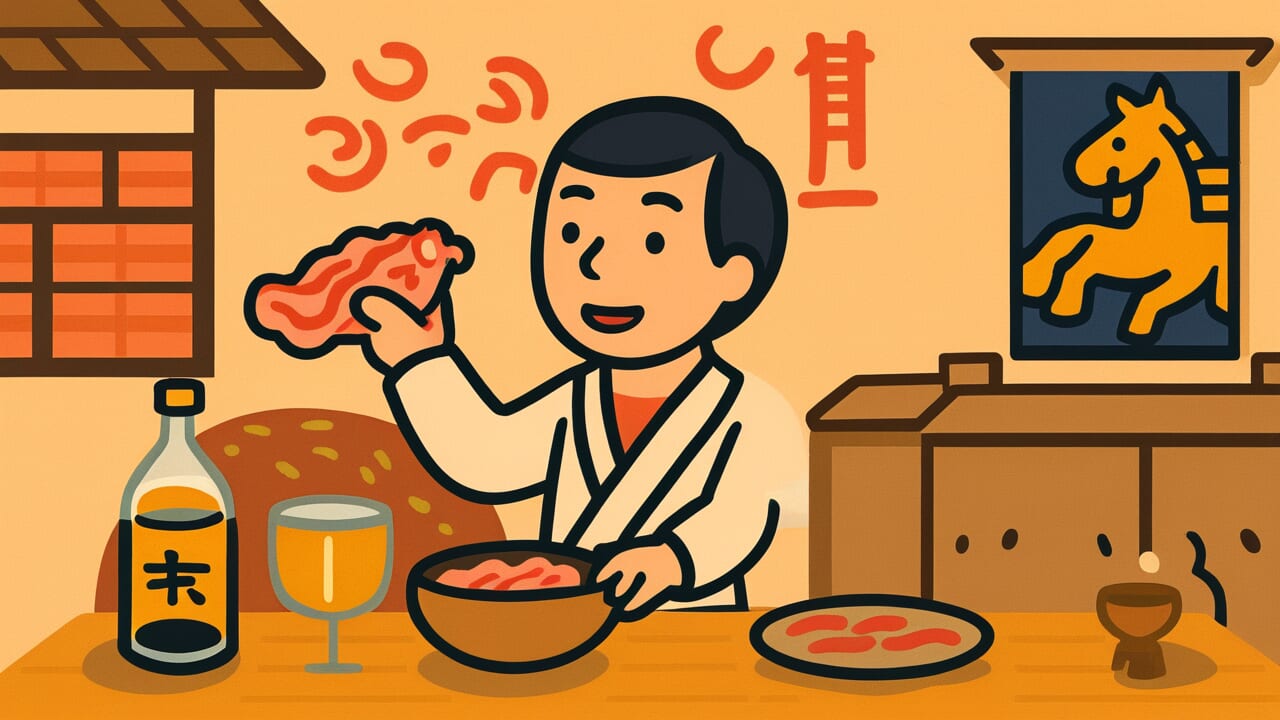How to Read “If you eat the meat of a good horse without drinking sake, you will harm people”
Zenba no niku wo kuraite sake wo nomazareba hito wo sokonau
Meaning of “If you eat the meat of a good horse without drinking sake, you will harm people”
This proverb means that even good things can cause harm if you don’t use them properly. Even if you obtain something valuable and nutritious like the meat of an excellent horse, it can hurt people if you don’t handle it correctly by drinking sake with it.
Today, people use this saying when talking about how to handle excellent abilities, resources, or opportunities. For example, you might gain advanced skills or knowledge, but without the wisdom to use them properly, you could trouble others or even hurt yourself.
The proverb shows that good things come with responsibility and care. Simply having something valuable isn’t enough. You need preparation and the right environment to bring out its true value.
This contains a deep insight about life and success.
Origin and Etymology
This proverb likely comes from ancient Chinese classics. A “good horse” means an excellent horse. In ancient China, people treasured horse meat as a food with strong nutritional benefits. The meat of a good horse was especially nutritious and believed to warm the body powerfully.
The key point here is the nature of horse meat itself. In traditional Chinese medicine, horse meat was considered a food that warms the body and circulates energy strongly. Because of this, people recommended drinking sake after eating horse meat to balance its strong effects.
Sake was believed to regulate the flow of energy in the body and soften the overly strong effects of horse meat.
If you ate horse meat without drinking sake, its strong effects would become unbalanced in your body. This could make you sick or irritable, eventually causing you to harm others. This thinking reflects Eastern philosophy, which emphasizes the balance of yin and yang.
The proverb contains deep wisdom: even good things can become harmful if you don’t balance them properly.
Usage Examples
- We introduced the latest equipment but didn’t train anyone to use it. Now it’s like “if you eat the meat of a good horse without drinking sake, you will harm people” – the workplace is in chaos.
- Even if we hire talented people, without proper support it becomes “if you eat the meat of a good horse without drinking sake, you will harm people.” Let’s build a solid welcoming system.
Universal Wisdom
This proverb teaches us an essential truth about human society: the more valuable something is, the more carefully you must handle it. We often focus only on obtaining good things and neglect the preparation and care needed to use them well.
Why do we keep making this mistake? Because humans experience a psychological distance between “the joy of getting” and “the responsibility of using.” The excitement of obtaining something and the steady effort of handling it properly create very different emotions.
The sense of achievement from gaining something excellent can actually make us less careful.
This proverb has been passed down for generations because it recognizes both sides of having power or resources. A knife can be a cooking tool or a weapon that hurts people. Medicine heals illness, but used wrongly, it becomes poison.
The more excellent something is, the greater its impact. That’s why maturity is required from those who handle it.
Our ancestors knew this truth. Real abundance isn’t about having good things. It’s about having the wisdom to use them properly. This wisdom may be even more important in our modern world of material wealth.
When AI Hears This
Horse meat contains more histidine, an amino acid, than other meats. Intestinal bacteria convert this histidine into a substance called histamine. Histamine is known for causing allergic symptoms. Large amounts can cause poisoning symptoms like headaches, nausea, and rashes.
What’s interesting here is the role of alcohol. You’d normally think drinking sake with food would be bad for your body, right? But actually, it’s the opposite.
Alcohol suppresses the activity of intestinal bacteria. This means drinking sake prevents histidine from converting to histamine. Alcohol also promotes gastric acid secretion, which speeds up protein digestion and shortens the time bacteria can act in the intestines.
Modern food hygiene science reports cases of histamine poisoning from eating raw horse meat like basashi. Histamine accumulates more easily in horse meat that has lost freshness due to bacterial action.
Ancient people didn’t have biochemistry knowledge, but they noticed through experience that “it’s safer to drink sake when eating horse meat.” This is a remarkable example of practical knowledge from observation accurately capturing molecular-level phenomena.
Lessons for Today
This proverb teaches modern people the importance of pausing to think when we gain something. When you learn a new skill, receive a responsible position, or get a valuable opportunity, that’s the moment to ask yourself: “What do I need to make the most of this?”
Modern society tends to seek faster and more. But what really matters isn’t quantity – it’s the quality of how you handle what you have.
Even with excellent tools, if you don’t learn to use them, they’re not just wasted. They might hurt you or those around you.
Look at the abilities and resources you have now. Are you using them fully? If not, what’s missing? Is it knowledge, experience, or support from others?
Getting good things and using them well are separate skills. Only when both come together does your life become truly rich.



Comments